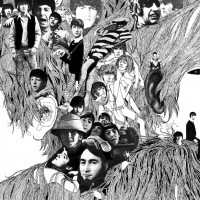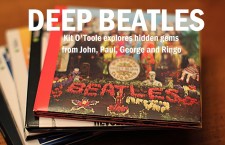The Beatles recorded their share of mysterious tracks, such as “I am the Walrus” or even the self-parody “Glass Onion.” Critics still analyze possible meanings of “Strawberry Fields Forever” or weird experiments like “What’s the New Mary Jane.” But the Revolver track “Doctor Robert” continues to baffle critics and fans alike.
Were the lyrics based on an actual person? Is it a pro-drug song, or an extended joke? Besides these much-debated questions, “Doctor Robert” contains some stellar guitar playing and trademark close harmonies, all adding up to a memorable song that stands out among the other innovative Revolver tracks.
Multiple theories about as to the identity of Doctor Robert. One involves a notorious April 1965 party hosted by John Riley, a London dentist and LSD enthusiast. George Harrison, John Lennon, and their wives attended this soiree, and unknowingly ingested the drug after Riley secretly dosed their coffee cups. Harrison later recalled their first LSD trip as a scary experience, subsequently identifying the doctor only as the “wicked dentist.”
Others speculate the song refers to Bob Dylan, who famously introduced the Beatles to marijuana. Yet another candidate includes London art dealer Robert Fraser, who provided various pills to the elite. In a 1980 interview, Lennon claimed he was Doctor Robert: “It was about myself. I was the one that carried all the pills on tour. Well, in the early days. Later on, the roadies did it. We just kept them in our pockets loose. In case of trouble.”
Paul McCartney attempted to set the record straight; he stated the inspiration was Dr. Robert Freymann, a New York drug supplier to the stars. While he ran a clinic on Manhattan’s East 78th Street, he was better known for giving vitamin B-12 shots containing amphetamines to his tony clientele. McCartney told biographer Barry Miles that he and Lennon had heard of the “Great White Father,” as Freymann was called, while touring in America.
Building on the idea of a drug-providing doctor, McCartney explained, he and Lennon composed what he considered a parody. “John and I thought that was a funny idea — the fantasy doctor who would fix you up by giving you drugs. It was a parody on that idea,” he said. “It’s just a piss-take. As far as I know, neither of us ever went to a doctor for those kinds of things. But there was a fashion for it and there still is. Change your blood and have a vitamin shot and you’ll feel better.”
No matter the meaning, “Doctor Robert” took shape on April 17, 1966, when the Beatles entered Abbey Road Studios. Lennon took over lead vocals and played rhythm guitar and harmonium; McCartney contributed backing vocals and bass; Harrison played lead guitar, maracas, and sang backing vocals; and Ringo Starr, naturally, played drums. They recorded the backing track in seven takes, with the lead vocals added two days later.
On April 19, the Beatles reentered the studio to record vocal tracks and oversee mono mixing. Interestingly, the original version of “Dr. Robert” featured an extended jam session, including a Harrison solo. A section of his performance can still be heard on the mono mix, just before the first “well well well” line. Listen for the guitar to quickly fade out before the vocals kick in. A slightly longer mix can be heard on the U.S. compilation Yesterday … and Today.
One can have a field day analyzing the lyrics, trying to determine the subject’s identity. Could “Take a drink from his special cup” refer to the dentist? What does the reference to the “National Health” mean (thus poking holes in the Freymann theory)? If Lennon really was describing himself in the song, he states he is a “new and better man” and “a man you must believe, helping anyone in need.” Here, Doctor Robert sounds like an evangelist of sorts, one who enlightens others with his magic medicine. Not only will he make you “feel fine,” he will “help you to understand.”
These words certainly suggest that Dr. Robert far from condemns drugs; instead, it suggests drug-taking as a way to expand one’s consciousness and seemingly operate on a higher creative plane.
While one may not agree with the song’s apparent pro-drug stance, there’s no denying the Beatles’ exquisite harmonies and gritty guitar work. When the refrain arrives, it sounds classically influenced and contrasts with the straight-ahead rock comprising most of the track. This highbrow/lowbrow comparison demonstrates Lennon and McCartney’s dry humor, that this drug supplier is somehow better and more elevated in stature than everyone else. Listen closely to Harrison, McCartney, and Lennon’s vocal blends at various points, and you’ll experience how each voice individually contributes to the song’s distinctive harmonies. Harrison’s guitar, which cuts sharply through the track, adds a rougher edge that obviously contrasts with the chamber-music feel of the refrain.
Lyrically complicated and harmonically sophisticated, “Doctor Robert” remains one of the more underrated tracks from the milestone Revolver album.
- The Rescued Early Paul McCartney Song That Completed ‘Beatles For Sale’ - December 4, 2024
- A Rare Beatles Cover Proves John Lennon Was Wrong About His Voice - November 26, 2024
- How John Lennon Came Roaring Back on the Beatles’ White Album - November 22, 2023




Underrated? I suppose. But, it has always been one of the go-to tracks on one of the Beatles’ best albums, for me.
While Revolver makes top billing on many lists, I think “Doctor Robert” sits rather comfortably on the American LP “Yesterday and Today.” Y&T screams guitar from start to finish, but also the bass and drums come to the fore, cementing a Beatles legacy as rockers. (Throw in “Paperback Writer” and “Rain”, if you want, for added depth.) The Rolling Stones and every one else were simply followers, despite what the media would have us believe.
Yes, The Beatles in 1966 defined classic rock. Make a mix CD or a playlist with these tracks, and hear for yourself.
Thanks for the analysis, Kit. Very nice.
Great article Kit! I hardly ever comment online but once I saw your name, well I felt I just had to!